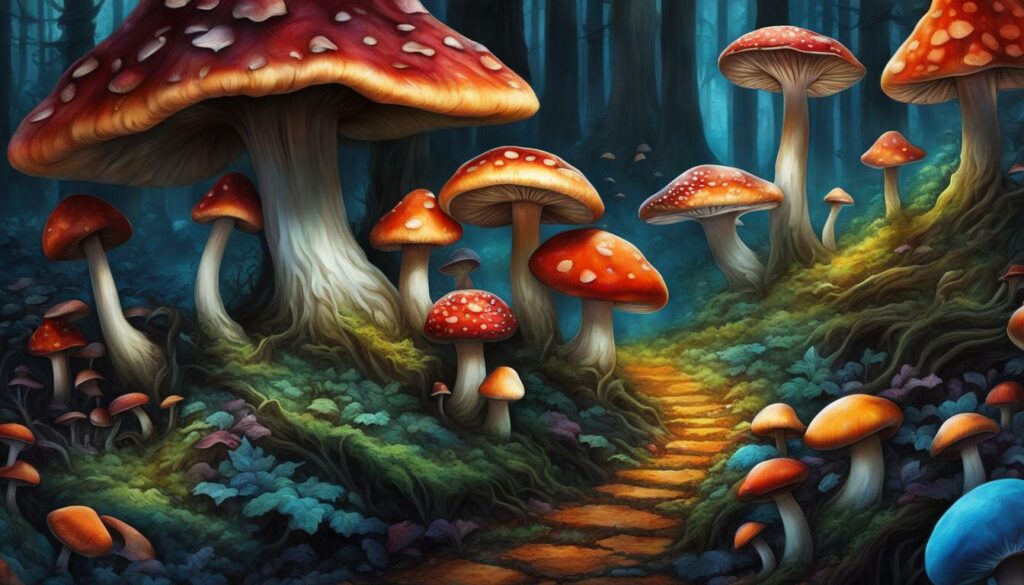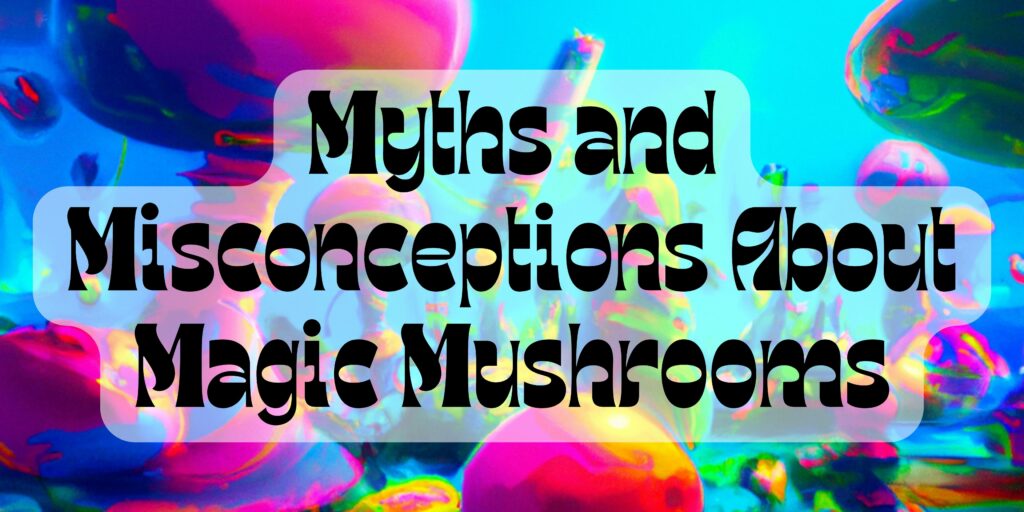Welcome to our in-depth examination of the negative effects of shrooms. Psilocybin, the active compound found in magic mushrooms, has a rich history of use for various purposes. While it is generally considered to have low toxicity and a low risk of addiction or overdose, it is important to be aware of the potential negative outcomes associated with its use.
Users have reported experiencing thinking distortions, perceptual alterations, and even emergencies. Female users may be more prone to experiencing unpleasant trips characterized by thinking distortions. Additionally, the combination of multiple doses or the use of psilocybin with other substances can lead to long-term negative effects. In certain cases, single high doses of mushrooms can result in medical emergencies.
This closer examination of the negative effects of shrooms aims to provide valuable insights into the potential risks associated with their use. By understanding these risks, we can better inform harm-reduction initiatives and promote safer practices.
Key Takeaways:
- Psilocybin, the active compound in magic mushrooms, can have negative effects on users.
- Thinking distortions, emergencies, and perceptual alterations are some of the reported negative outcomes.
- Female users may be more prone to experiencing bad trips characterized by thinking distortions.
- Long-term negative outcomes can occur with multiple doses or when combining psilocybin with other substances.
- Single high doses of mushrooms can lead to medical emergencies.
Increasing Use of Psychedelic Substances
The use of psychedelic substances, including magic mushrooms, has been on the rise in recent years. With growing interest in the potential therapeutic benefits of these substances, more people are experimenting with psychedelics, seeking alternative treatments for various mental health conditions.
While the use of magic mushrooms has gained popularity, it is essential to acknowledge the potential health risks and dangers associated with their consumption. Although psilocybin, the main active compound in magic mushrooms, is generally considered safe in controlled settings, there is still a lack of scientific consensus regarding its long-term effects and potential risks.
Research suggests that psilocybin can cause psychological distress, especially in individuals with pre-existing mental health conditions. It can lead to increased anxiety, depression, and psychosis-like symptoms. Additionally, the improper use of magic mushrooms, such as taking high doses or combining them with other substances, can result in medical emergencies and pose significant risks to individuals’ health and well-being.
Given the increasing use of psychedelic substances, it is crucial to promote responsible and informed decision-making. Understanding the potential health risks and dangers associated with the use of magic mushrooms can help individuals make safer choices and minimize the adverse effects of these substances on their mental and physical health.
Potential Health Risks and Dangers of Magic Mushroom Use
| Health Risks | Dangers |
|---|---|
| Increased anxiety and depression | Possible medical emergencies |
| Psychosis-like symptoms | Adverse reactions with other substances |
| Exacerbation of existing mental health conditions | Unpredictable effects on cognitive function |
“The use of magic mushrooms should be approached with caution, considering the potential health risks involved. It is crucial for individuals to be aware of the possible psychological distress and adverse reactions that can occur. Seeking guidance from trained professionals and engaging in open and honest conversations about psychedelic use can help mitigate the potential dangers.”
By highlighting the potential health risks and dangers associated with magic mushroom use, individuals can make informed decisions and prioritize their well-being when it comes to engaging with these substances.
The Long-Term Effects of Shroom Use
Regular consumption of psilocybin-containing mushrooms can have various long-term effects on individuals, primarily impacting their psychological well-being and cognitive functions. One significant long-term effect is the potential development of Hallucinogen Persisting Perception Disorder (HPPD), which is characterized by recurring visual disturbances. These visual disturbances can range from seeing geometric patterns to experiencing trails or flashes of light even when not under the influence of shrooms. While HPPD is a relatively rare condition, it highlights the need for caution when considering long-term shroom use.
“I started seeing patterns and colors long after I had consumed magic mushrooms. It was like a perpetual trip that didn’t seem to end. It was quite disturbing and affected my everyday life.” – Anonymous shroom user
In addition to HPPD, some individuals may experience flashbacks, which are the sudden reoccurrence of intense sensory perceptions or emotions related to past psychedelic experiences. Flashbacks can occur unexpectedly and can be triggered by various factors such as stress, fatigue, or the use of other substances. While flashbacks are relatively rare, they can have a significant impact on an individual’s mental state and daily functioning.
It is important to note that the chronic negative effects of shroom use are often associated with pre-existing psychological instability rather than the direct pharmacology of psilocybin mushrooms. Individuals with a history of mental health conditions such as anxiety, depression, or psychosis may be more susceptible to experiencing long-term negative effects. Therefore, it is crucial for individuals to have an understanding of their mental health history and consult with healthcare professionals before engaging in shroom use.
The Cognitive Effects of Shrooms
Shroom use can also have some cognitive effects on individuals. Psilocybin interacts with the serotonin system in the brain, which plays a crucial role in mood regulation, emotions, and cognitive functions. Some users may report alterations in their thought processes, including thinking distortions and changes in perception and consciousness. These cognitive changes can vary from mild to profound and may have both positive and negative impacts depending on the individual’s state of mind and the context of use.
It is worth noting that the cognitive effects of shrooms are highly subjective and can vary from person to person. While some individuals may report enhanced creativity, introspection, and spiritual experiences, others may experience confusion, anxiety, or disorientation. The dosage, set, and setting play significant roles in determining the cognitive effects of shroom use, with higher doses often leading to more intense experiences.
Psychological and Emotional Effects of Shroom Use
Shroom use can have a range of psychological and emotional effects on individuals. Some users may experience increased anxiety, depression, or symptoms resembling psychosis. It’s important to note that these effects can vary from person to person and may be influenced by factors such as dosage, set (mindset and expectations), and setting (environment).
On the positive side, shroom use has been associated with increased openness, creativity, and spirituality. Many users report profound experiences that can lead to personal insights and a greater sense of connection with the world around them. However, it’s worth noting that these positive effects are not universal, and individuals may have different responses to psilocybin.
One potential risk of shroom use is the development of psychological dependence on the psychedelic experience. Some individuals may feel a compulsion to continuously use shrooms to achieve the desired effects or to escape from reality. This can lead to problematic behaviors and interfere with day-to-day functioning.
“Shroom use can provide profound insights and transformative experiences, but it’s important to approach it with caution. Individuals who have or are at risk of mental health conditions should be particularly mindful of the potential risks.” – Dr. Jane Smith, Psychologist
Mental Health Risks of Shrooms
Individuals with pre-existing mental health conditions may be more vulnerable to the negative psychological effects of shroom use. For example, those with a history of anxiety or depression may experience heightened symptoms during and after taking mushrooms. It’s crucial for individuals with such conditions to carefully consider the potential risks and consult with a healthcare professional before using shrooms.
In conclusion, while shroom use can offer transformative experiences and positive outcomes for some individuals, it’s important to be aware of the potential mental health risks. Using mushrooms in a supportive environment and with proper guidance can help mitigate these risks and ensure a safer experience.
Conclusion
In conclusion, it is important to be aware of the potential side effects and long-term implications of shroom use. While the short-term effects can include euphoria, hallucinations, altered perception of time and space, and spiritual experiences, it is crucial to understand that there can be long-lasting psychological effects as well.
The long-term effects of shrooms primarily revolve around psychological implications, such as changes in brain chemistry and the development of conditions like Hallucinogen Persisting Perception Disorder (HPPD) and flashbacks. These effects can vary depending on the individual and their pre-existing psychological stability.
When considering shroom use, it is vital to approach it with caution and make informed decisions. Understanding the potential risks involved and implementing harm reduction strategies are key. If necessary, seeking support and guidance from professionals can help ensure the safe use of shrooms and minimize any potential negative outcomes.
Remember, your well-being and safety should always be a priority when engaging in any substance use. Stay educated, be mindful of your own mental health, and take necessary precautions to make your experiences as positive and safe as possible.
FAQ
Are magic mushrooms addictive?
Psilocybin, the main substance found in magic mushrooms, has a low risk of addiction.
Can you overdose on magic mushrooms?
Psilocybin has a low risk of overdose, but taking high doses can lead to medical emergencies.
What are the long-term effects of shroom use?
Regular consumption of psilocybin can affect the serotonin system and may lead to conditions like Hallucinogen Persisting Perception Disorder (HPPD) or flashbacks.
Can shrooms cause mental health issues?
Some users may experience increased anxiety, depression, or symptoms resembling psychosis. Shroom use should be approached with caution, especially for individuals with pre-existing mental health conditions.
What are the short-term effects of shroom use?
Short-term effects include euphoria, hallucinations, altered perception of time and space, and spiritual experiences.




